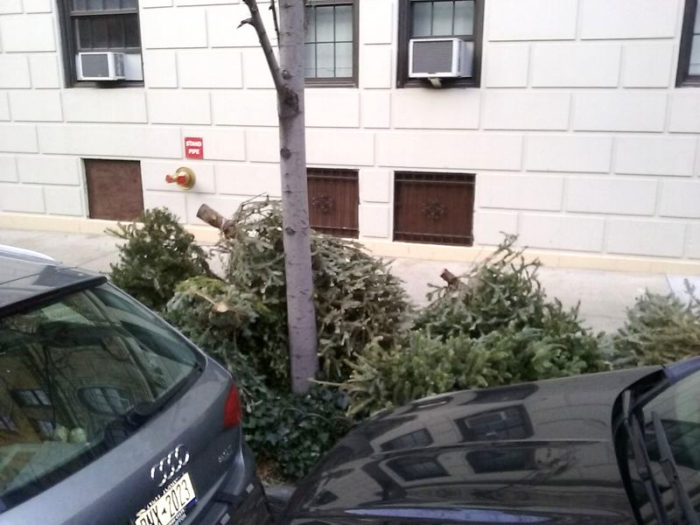Christians’ “war on Christmas”
First, I thought Christmas was supposed to be about peace and goodwill. I didn’t come up with the concept of a “war” on Christmas. I heard it most from Christians. Snopes traces it to Henry Ford, who attacked Jews with it:
“Last Christmas most people had a hard time finding Christmas cards that indicated in any way that Christmas commemorated Someone’s Birth,†wrote Henry Ford in 1921, more than 80 years before Bill O’Reilly would utter similar complaints on Fox News.
The iconic American business tycoon and anti-Semite issued a series of pamphlets in the 1920s (collected under the title The International Jew: The World’s Foremost Problem) accusing American Jews of, among countless other crimes, engaging in a conspiracy to “abolish†Christmas celebrations in public places:
“Not only do the Jews disagree with Christian teaching — which is their perfect right, and no one dare question it — but they seek to interfere with it. It is not religious tolerance in the midst of religious difference, but religious attack that they preach and practice. The whole record of Jewish opposition to Christmas, Easter and certain patriotic songs shows that.”
If the celebration is supposed to celebrate a birth in Bethlehem, there was no snow there, nor sleigh bells. Probably not many fir trees, either. Celebrating northern European winters, as Christians do, seems a distraction from a Bethlehem birth.
Elves are pagan, of Germanic origin, outside Christianity, so talking about them, as Christians do, seems to distract from Christianity. Wikipedia says Luisa May Alcott, who wrote Little Women, made up Santa’s elves, so they seem to distract from Jesus’s birth.
Santa’s current incarnation of a fat man in red and white resulted from Coca-Cola’s marketing, mostly the work of Christians, which seems to distract from Christianity, and profit from it. And cause more obesity.
Black Friday used to begin the day after Thanksgiving, but now begins during Thanksgiving, undermining family. Thanksgiving isn’t a Christian holiday, but Christmas undermining family, which doesn’t seem to help Christianity. On the contrary, it recalls this passage on commerce overriding Jesus’s domain:
And Jesus entered the temple and drove out all who sold and bought in the temple, and he overturned the tables of the money-changers and the seats of those who sold pigeons. He said to them, “It is written, ‘My house shall be called a house of prayer,’ but you make it a den of robbers.â€
This year, I heard Christmas music in stores before Halloween.
Christmas fir trees are a distraction from a Bethlehem birth. Wikipedia cites sources that “While today the Christmas tree is a recognized symbol for the holidays, it was once a pagan tradition unassociated with Christmas traditions.”
To the extent Christians believe in stewarding the environment, cutting down all those trees for a few weeks’ use then to fill landfills with them, where they will decompose anaerobically to form methane, a more heat-trapping greenhouse gas than carbon dioxide, doesn’t seem very Christian. Here is one day on a couple blocks near me:
A few days or weeks of entertainment—a pagan distraction from a Bethlehem birth—followed by centuries of climate change.
Yule is a Nordic, pagan, heathen holiday that Christians connect to Christmas. I don’t see pagans imposing it on them.
What Christmas could mean
Here is a Christmas image representing what created my country: men who bravely faced the elements, risking their lives to create better lives for future generations. Today, nearly no American will forego his or her comfort and convenience to stop polluting the worlds of future generations, likely undermining peace by using up non-renewable resources.

The first North American banning of Christmas
Snopes tells of the first official banning observing Christmas they found, by Christians:
In 1659, the Puritan lawmakers of the Massachusetts Bay Colony followed the example of their brethren in England by issuing an edict outlawing the observance of Christmas (and other “superstitious†holidays):
“For preventing disorders arising in several places within this jurisdiction, by reason of some still observing such festivals as were superstitiously kept in other countries, to the great dishonor of God and offence of others, it is therefore ordered by this Court and the authority thereof, that whosoever shall be found observing any such day as Christmas or the like, either by forbearing of labor, feasting, or any other way, upon such accountants as aforesaid, every person so offending shall pay of every such offence five shillings, as a fine to the county.”
Why? Because, as befitted their name, the Puritans found feasting, wassailing, gift giving, and wishing one another a merry Christmas ungodly and sinful (we suspect not even the secularized greeting “Happy holidays†would have been acceptable to this lot).
Read my weekly newsletter

On initiative, leadership, the environment, and burpees
















